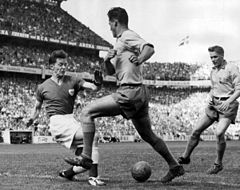Östers IF
| logo | |||
| Full name | Östers Idrottsförening | ||
|---|---|---|---|
| Founded | 1930 | ||
| Ground | Myresjöhus Arena, Växjö | ||
| Capacity | 12,000 | ||
| Chairman | Sven Johannesson | ||
| Head coach | Thomas Askebrand | ||
| League | Superettan | ||
| 2016 | Division 1 Södra, 1st (promoted) | ||
|
| |||
Östers Idrottsförening, commonly known as Östers IF or simply Öster, is a Swedish sports club located in Växjö, currently specializing in football. The club has previously also competed in ice hockey (see separate article), bandy, and bowling. Öster was formed on 20 April 1930 as Östers Fotbollförening and is currently playing in the second division of Swedish football, Superettan. In 1968 Öster became the second ever team to win Allsvenskan as newcomers (the only other team being IF Elfsborg in 1961). However, they were the first ever team to win Allsvenskan at the first attempt, since 1968 was their first ever season in Allsvenskan (IF Elfsborg had been playing in Allsvenskan before 1961, winning the league in 1936, 1939 and 1940).[1] This ignited the team's golden age which lasted until the early-1980s and saw them win a total of four Swedish championships. The club is affiliated to the Smålands Fotbollförbund.[2]
On March 31, 2011, Öster broke ground on their new arena, Myresjöhus Arena,[3] which was inaugurated in August 2012. The arena hosted four games of the UEFA Women's Euro 2013 tournament.[4]
History

Öster (English: "East") was named after a district in the city of Växjö. They were not part of the upper divisions in the early days of swedish football and only made their first appearance in the third tier in 1947. During the 1950s and early-1960s the club made a push to raise the level of football by inviting and playing against foreign teams such as Flamengo, Juventus and Fluminense. This coupled with an increase in the amount of training helped the team establish themselves in the second tier.
In 1961 Öster had their first ever chance to qualify for Allsvenskan but ended up in last place in the four team promotion playoffs. Success in the promotion playoffs would instead come six years later in 1967 when they beat IK Brage in the deciding game in front of a home crowd of 26,404 people. Öster defied the odds during their first ever season in the top division and won the league on goal difference after a total of four teams had ended the season on exactly the same number of points. Following their championship title the club had ten years of solid Allsvenskan finishes before becoming dominant in the late-1970s and early-1980s where they won the league three times in four years.
After that successful era followed a slow decline over the next couple of decades which culminated in their relegation to the second tier in 1998. After that the club has found it hard to reestablish itself in Allsvenskan and has only made short one year appearances.
Current squad
- As of 10 August 2017[5]
Note: Flags indicate national team as defined under FIFA eligibility rules; some limited exceptions apply. Players may hold more than one non-FIFA nationality.
|
|
Available Youth Player
Note: Flags indicate national team as defined under FIFA eligibility rules; some limited exceptions apply. Players may hold more than one non-FIFA nationality.
|
|
Personnel

Current technical staff
| Director of Football: | |
| Head Coach: | |
| Assistant Coach: | |
| Head of youth department: |
Managers
|
|
Achievements

- Swedish Champions[B]
- Winners (4): 1968, 1978, 1980, 1981
League
- Allsvenskan:
- Winners (4): 1968, 1978, 1980, 1981
- Runners-up (3): 1973, 1975, 1992
- Superettan:
- Winners (2): 2002, 2012
- Runners-up (1): 2005
- Division 1 Södra:
- Winners (3): 1989, 2009, 2016
- Runners-up (1): 2008
Cups
- Svenska Cupen:
- Winners (1): 1977
- Runners-up (4): 1974, 1982, 1985, 1991
- Allsvenskan play-offs:
- Runners-up (1): 1983
Attendances


In recent seasons Östers IF have had the following average attendances:
* Attendances are provided in the Publikliga sections of the Svenska Fotbollförbundet website.[7] |
Footnotes
- A ^ Current youth players who at least have sat on the bench in a competitive match.
- B. ^ The title of "Swedish Champions" has been awarded to the winner of four different competitions over the years. Between 1896 and 1925 the title was awarded to the winner of Svenska Mästerskapet, a stand-alone cup tournament. No clubs were given the title between 1926 and 1930 even though the first-tier league Allsvenskan was played. In 1931 the title was reinstated and awarded to the winner of Allsvenskan. Between 1982 and 1990 a play-off in cup format was held at the end of the league season to decide the champions. After the play-off format in 1991 and 1992 the title was decided by the winner of Mästerskapsserien, an additional league after the end of Allsvenskan. Since the 1993 season the title has once again been awarded to the winner of Allsvenskan.[8]
References
- ^ sv:IF Elfsborg
- ^ "Kontaktuppgifter och tävlingar – Smålands Fotbollförbund – Svenskfotboll.se". Retrieved 2011-01-13.
- ^ "Första spadtaget på Myresjöhus Arena". Retrieved 2011-04-05.
- ^ "Sweden awarded UEFA Women's EURO 2013". Retrieved 2011-04-05.
- ^ "Herrtruppen 2017" (in Swedish). Östers IF. Retrieved 10 August 2017.
- ^ http://www.osterfotboll.com/uploads/publiktrycket_april_2007.pdf
- ^ "Kontaktuppgifter och tävlingar – Svenska Fotbollförbundet – svenskfotboll.se". Retrieved 2010-12-09.
- ^ "Svenska mästare 1896–1925, 1931–". svenskfotboll.se (in Swedish). Retrieved 2009-11-25.
